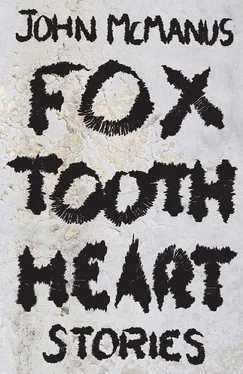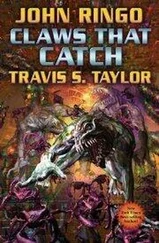John McManus - Fox Tooth Heart
Здесь есть возможность читать онлайн «John McManus - Fox Tooth Heart» весь текст электронной книги совершенно бесплатно (целиком полную версию без сокращений). В некоторых случаях можно слушать аудио, скачать через торрент в формате fb2 и присутствует краткое содержание. Жанр: Современная проза, на английском языке. Описание произведения, (предисловие) а так же отзывы посетителей доступны на портале библиотеки ЛибКат.
- Название:Fox Tooth Heart
- Автор:
- Жанр:
- Год:неизвестен
- ISBN:нет данных
- Рейтинг книги:3 / 5. Голосов: 1
-
Избранное:Добавить в избранное
- Отзывы:
-
Ваша оценка:
- 60
- 1
- 2
- 3
- 4
- 5
Fox Tooth Heart: краткое содержание, описание и аннотация
Предлагаем к чтению аннотацию, описание, краткое содержание или предисловие (зависит от того, что написал сам автор книги «Fox Tooth Heart»). Если вы не нашли необходимую информацию о книге — напишите в комментариях, мы постараемся отыскать её.
Fox Tooth Heart — читать онлайн бесплатно полную книгу (весь текст) целиком
Ниже представлен текст книги, разбитый по страницам. Система сохранения места последней прочитанной страницы, позволяет с удобством читать онлайн бесплатно книгу «Fox Tooth Heart», без необходимости каждый раз заново искать на чём Вы остановились. Поставьте закладку, и сможете в любой момент перейти на страницу, на которой закончили чтение.
Интервал:
Закладка:
For six months Victor played D&D, drinking more than Hugh and Clint and their other friends. The fakeness of the game’s dungeons compared to his dungeons stopped mattering. The energy he’d once spent hating names like Hugh’s he funneled into a crush on the boy, battling orcs until finally he acknowledged that they would never get naked together. That didn’t stymie him long. He drank until his old idiosyncrasies were like a logic problem he’d solved. He started going to the quarry on weekends. One moonlit Friday there, as some girls teased him about his gaming days, he thought how lucky he was that the Alfssons had banished Albert. Without outgrowing Albert, he couldn’t have outgrown Hugh. Now he would also outgrow these girls, along with their friends. It was a destiny that seemed to stem from innate willpower. Night after night he drank with whomever at whatever house, whatever their names. Then one day as he was about to check the mailbox, he heard someone saying, “Micah,” and gazed across at a gigantic figure in the Alfssons’ downstairs window, summoning him.
Ignore, pretend, thought Victor. In a sort of trance, he walked over. There in a window that rose to the level of his neck, backward on a couch, knelt a curly-haired teenager bloated to nearly three hundred pounds.
For a moment Victor feared there’d been yet another spirit trade, until the pale, obese boy said, “I need to discuss Albert.”
“You’re supposed to be in high school,” Victor said, hoping none of his friends would drive past and see.
“I’m in the equivalent of the twentieth grade. It’s Albert who’s unwell.”
“Come again?” said Victor, although he’d heard clearly.
“He wonders why you abandoned him.”
When Victor didn’t answer, Sievert carried on. “He sends you love letters that our mom burns. He carved your name in his bed frame and everyone saw.”
“I’m sorry.”
“You’ve never asked for his address.”
“What’s his address?”
“If you don’t love Albert back, write it. I’ll send it.”
Through the window Sievert offered a sheet of paper, the sight of whose untidy torn chads made Victor yearn for a drink. “Why would you want his heart broken?” he asked.
“If he falls out of love, he won’t go to hell.”
“Okay,” said Victor, taking the paper along with a pen. Against the house siding he wrote, Dear Albert . About to tell a vague lie like I miss you , he wondered what kind of retard carved into a bed that he loved a boy.
He glanced behind him at his own house and imagined Sievert peering through a telescope, jacking off and eating hot dogs.
Fat Sievert was the one who loved him.
Now Victor knew exactly what to do. I have a whole new life , he wrote on the paper. We were immature kids. You called yourself a devil worshiper, which is stupid. I don’t miss you. I never loved you. — Victor (Micah)
“Here,” he said, handing it back.
“Thanks,” said Sievert. “Bye.”
Retreating across the Alfssons’ yard, Victor doubted his reasoning. If Sievert really liked him, he’d have kept him lingering longer by the window. “Wait!” he would be calling. And what if he mailed the letter? Walking faster, Victor grew light-headed the way he used to. The idea of a lovelorn Albert reading his hateful words might have sent him regressing into a panic if not for the acceptance packet he discovered in the mailbox from Tulane.
Disrobing in his bedroom before the open blinds, Victor recalled his idea that Sievert was a hot name. It wasn’t. Nor was it a fat name. Names, like most things, were far more complicated than that. He’d been correct to deem the world half beautiful and half ugly, but he’d been wrong to seek a clear dividing line. The correct line split past from future. His task as a curator of aesthetic pleasure was to locate ugliness in the future, and sequester it in the past. He’d done as much with Albert and Sievert, and now he would do it with Mississippi, too. To tidy the world in this way gratified him. Buzzing with expectancy, he knelt. As he touched himself in sight of the Alfssons’ family room, he allowed himself one last image of his old friend in his defaced cot at military school, weeping poignantly for Victor, unaware of falling into the past.
Victor’s cocaine habit began the night he arrived in New Orleans, when he asked an upperclassman in the dorm to point him toward the gay bars. A cab took him to Bourbon Street, where a spot called Oz swarmed with celebrants of something called Southern Decadence. Victor wound up on a balcony among men thrice his age. “Looks like trouble,” said one. “Truckload,” said another, bringing Victor’s rigid childhood mind clamping down on him. But before he could explore his panic’s source, someone bought him a whiskey. His need to demand that these drunks be annihilated along with their gaudy city vanished like any flash of déjà vu. Where had he been all their lives? Did he want to come into the bathroom? Yes, he replied, and yes to all that was asked on every sultry evening from there on out. The flirters would muss his hair, smiling at their sly prowess as if he might ever tell anyone no. He didn’t.
Years passed. He liked how New Orleans had so few unsightly buildings. The ones that did exist never had him gasping for breath. He considered structural design often enough that he wound up majoring in it, then entering the master’s program. He thought too about the design of his face. Men were asking if he’d considered modeling. No, he replied coyly each time, as if he had no idea of his effect on people. He’d been drinking enough to rarely eat. Was it conceited to believe the svelte angles of his jaw derived from his state of mind? With his clutter of tics, he’d been an ugly child. These days he barely had to slouch against a bar before someone touched him.
During hangovers a memory would surface of his writing I don’t miss you, I never loved you , and he would bury his face in his hands. Mostly, though, he was drunk and high.
In his second year of grad school he never got around to applying for internships, but it didn’t matter, a partner at a prestigious firm fell for him at a bar. Victor had been staring at this silver fox’s wing-tipped shoes when the man said, “Salvatore Ferragamo.”
At first that seemed to be Gary’s name. “I’m Victor,” he replied.
“You’re the sort of boy folks like to take advantage of.”
“What do you mean?” he said, sensing already the pheromones Gary was exuding as he fell in love. The capture was as easy as that. A string of endless hot days followed, during which Victor seemed to have stumbled into his own dream-life. Gary lived in a mansion full of mirrors and varnished wood, where old-guard fetishists whiled away their dissolute days in high abandon. Bolted to the bedroom wall was a barred-top pup cage Gary would padlock him inside of. I’ve arrived, thought Victor, soaking naked with the guys in a backyard pool, nursing hangovers with mint juleps. Reasoning that Gary would give him a job whenever he asked, he felt no urgency to start work. Soon a dozen coke dealers knew his name, which filled him with well-being akin to professional pride. He would emerge from blackouts inhaling powder off Gary’s house key. “Boys have committed suicide over me,” he told the barflies who had become his friends. “I was fourteen when I got one sent off to military school.”
“You must have been a hot fourteen-year-old.”
“Albert thought so,” he said with a curt laugh. “When I arrived to bust him out, he’d already slit his wrists.”
“Did you love him?”
“I lived to see another day.”
Chuckling again, Victor wondered if his letter might really have pushed Albert over the edge. Later, alone, he searched online for his old friend. None of the Albert Alfssons he found was the one he’d known. A quest for Sievert led him to a blog about the complexity of God, with no photograph or mention of family. If he phoned home to Mississippi, his mother would inquire about his work. He’d lie and tell her he had a job. Best not to call again until it became true.
Читать дальшеИнтервал:
Закладка:
Похожие книги на «Fox Tooth Heart»
Представляем Вашему вниманию похожие книги на «Fox Tooth Heart» списком для выбора. Мы отобрали схожую по названию и смыслу литературу в надежде предоставить читателям больше вариантов отыскать новые, интересные, ещё непрочитанные произведения.
Обсуждение, отзывы о книге «Fox Tooth Heart» и просто собственные мнения читателей. Оставьте ваши комментарии, напишите, что Вы думаете о произведении, его смысле или главных героях. Укажите что конкретно понравилось, а что нет, и почему Вы так считаете.












